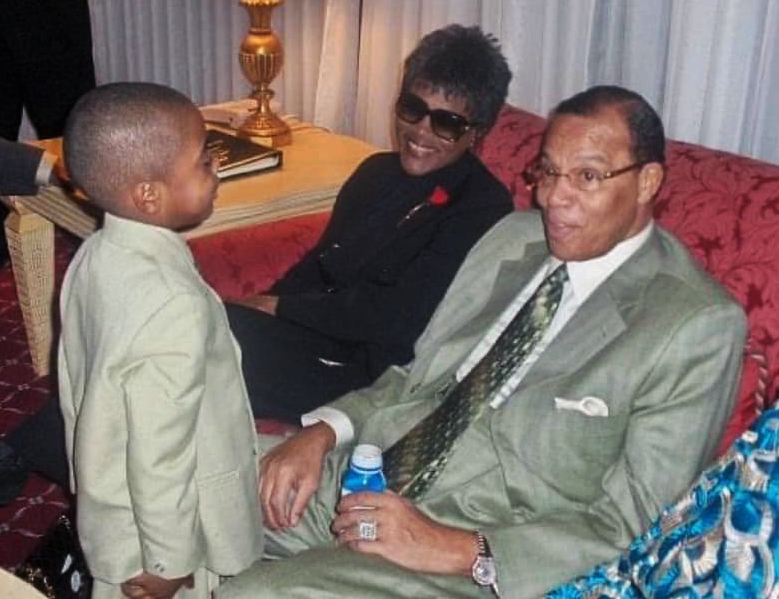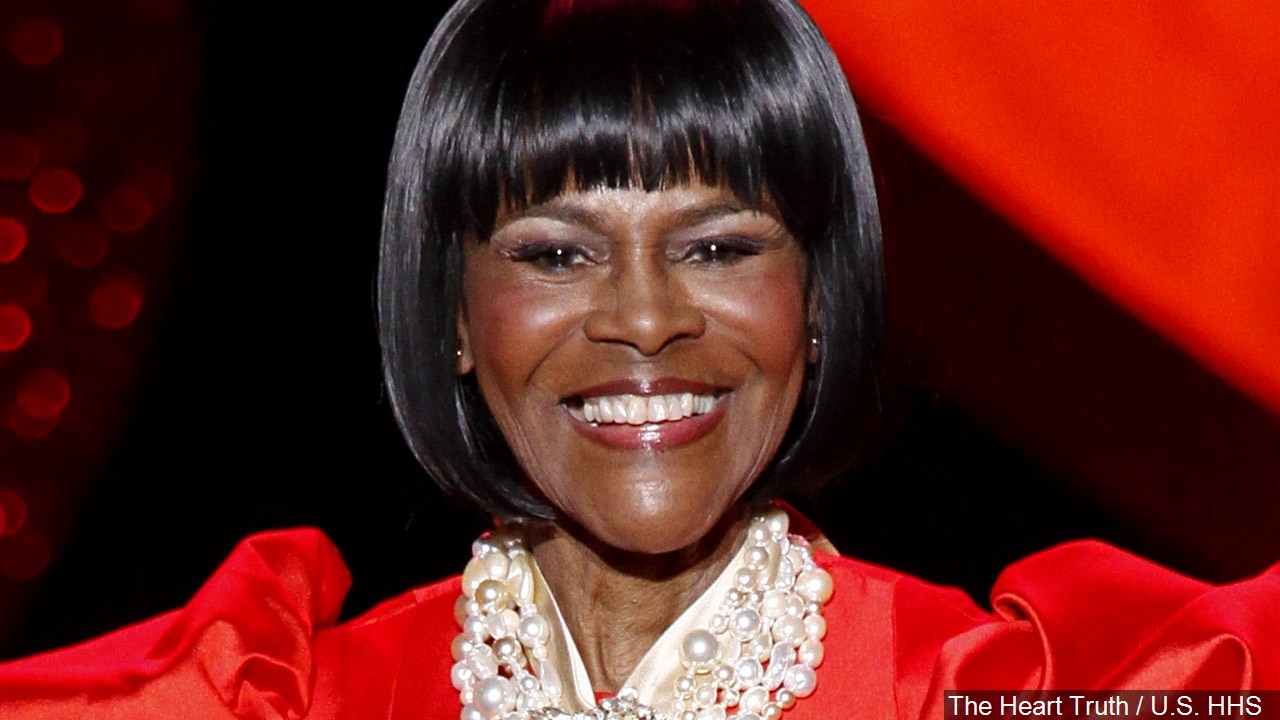Snow, suffering, loss are signs of America’s downfall Latest onslaught of unusual, deadly and punishing weather is driven by divine chastisement
By Michael Z. Muhammad, Contributing Writer- February 23, 2021
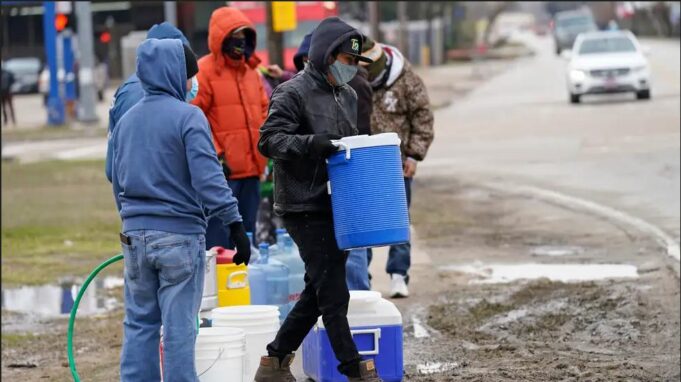
In boxing parlance, it’s called a shoeshine.
It’s when an opponent is hit with a flurry of devastating combinations, leaving him dazed and confused.
From Massachusetts to the Mexican border, Winter Storm Uri wreaked havoc with a lethal shoeshine combination of snow and ice from coast to coast, including the deep South and Southwest. It caused death and destruction in its path leaving America dazed and confused as we sit ringside witnessing what the Honorable Elijah Muhammad, the patriarch of the Nation of Islam, called “The Fall of America.”
NEWS ANALYSIS
Messenger Muhammad, in his monumental book of the same name, states, “America has mistreated the Black man for four hundred years, and she does not think that there is ever a God who will accept her Black slave and return on her head the injustice done to her Black slave.”
“The Bible prophesies of the plagues that would come upon America—and these plagues are falling on America now,” he writes. “The four Great Judgments that Allah (God) promises to destroy America are now coming upon her … hail, snow, drought, earthquake. Allah (God) has reserved His treasures of snow and ice to be used against the wicked country America in the day of battle and war.”
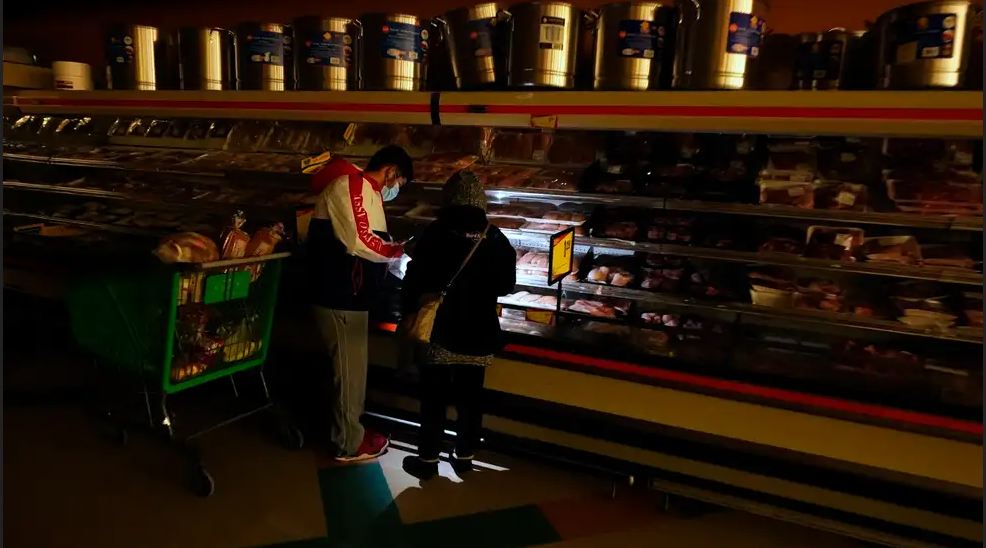
Headlines in many major newspapers across the United States bore witness to this divine insight as record snow and ice placed a crippling blow on the country.
As if to send a wider message to the world, snow fell in the deserts of Saudi Arabia baffling camels.
U.S. suffers under destructive and deadly weather
But the USA was the number one target for the storms and destruction as many thought winter was coming to an end. In early February, all 50 states suffered from below freezing temperatures and broke a record set in 2013.
Severe weather that followed wasn’t just snow, ice and cold.
“Deadly winter storms battering the country’s South and the heartland left millions without power in Texas … and spawned a possible tornado that killed at least three people in North Carolina. More freezing weather and dangerous travel conditions were predicted in the coming days,” reported CBS News Feb. 16.
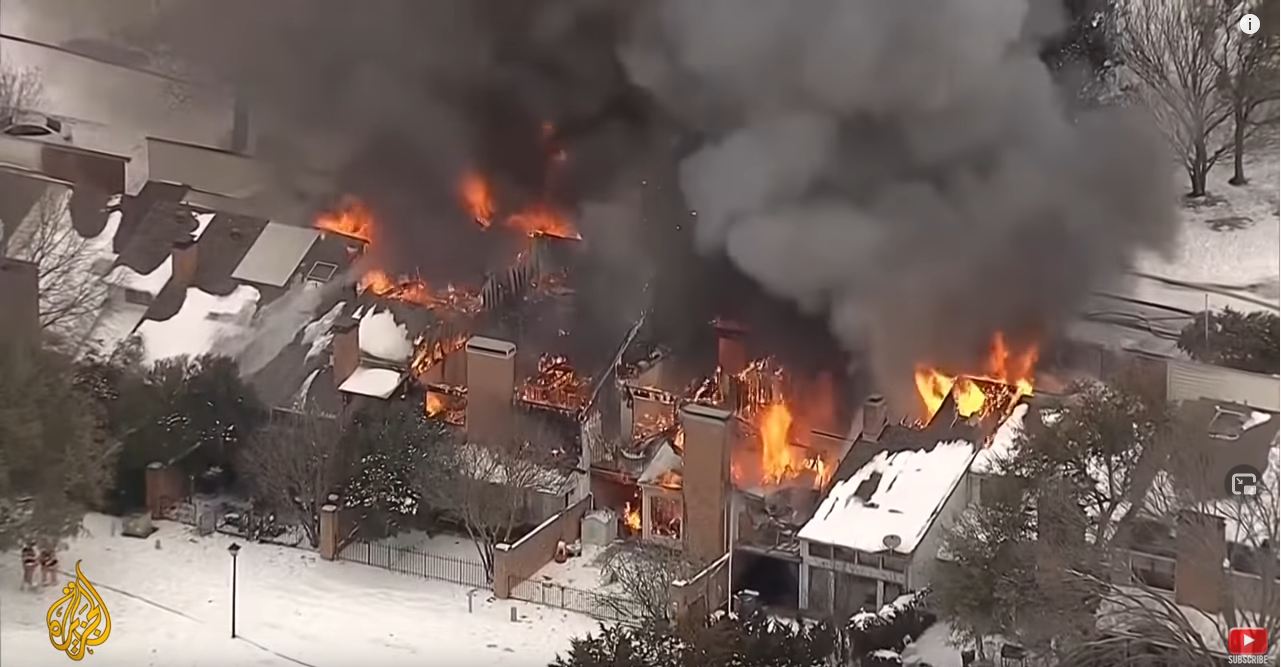
People struggling to stay warm triggered house fires. Image: Youtube
“The suspected tornado that hit North Carolina’s Brunswick County around midnight ripped homes from foundations, snapped trees in half, and injured at least ten people,” the county’s emergency services said.
“Across the country, at least 31 people have died since the punishing winter weather began last week. Some died in crashes on icy roads, others succumbed to the cold and others were killed when desperate attempts at warmth turned deadly,” said media reports Feb. 19.
As electricity was being restored in the Lone Star State, water woes rose.
Many of the millions of Texans who lost power for days after a deadly winter blast overwhelmed the electric grid now have it back, but the crisis was far from over in parts of the South, with many people lacking safe drinking water.
More than 190,000 homes and businesses remained without power in Texas, according to poweroutage.us Feb. 19, down from about 3 million two days earlier, though utility officials said limited rolling blackouts were still possible.
“The suspected tornado that hit North Carolina’s Brunswick County around midnight ripped homes from foundations, snapped trees in half, and injured at least ten people,” the county’s emergency services said.
“Across the country, at least 31 people have died since the punishing winter weather began last week. Some died in crashes on icy roads, others succumbed to the cold and others were killed when desperate attempts at warmth turned deadly,” said media reports Feb. 19.
As electricity was being restored in the Lone Star State, water woes rose.
Many of the millions of Texans who lost power for days after a deadly winter blast overwhelmed the electric grid now have it back, but the crisis was far from over in parts of the South, with many people lacking safe drinking water.
More than 190,000 homes and businesses remained without power in Texas, according to poweroutage.us Feb. 19, down from about 3 million two days earlier, though utility officials said limited rolling blackouts were still possible.
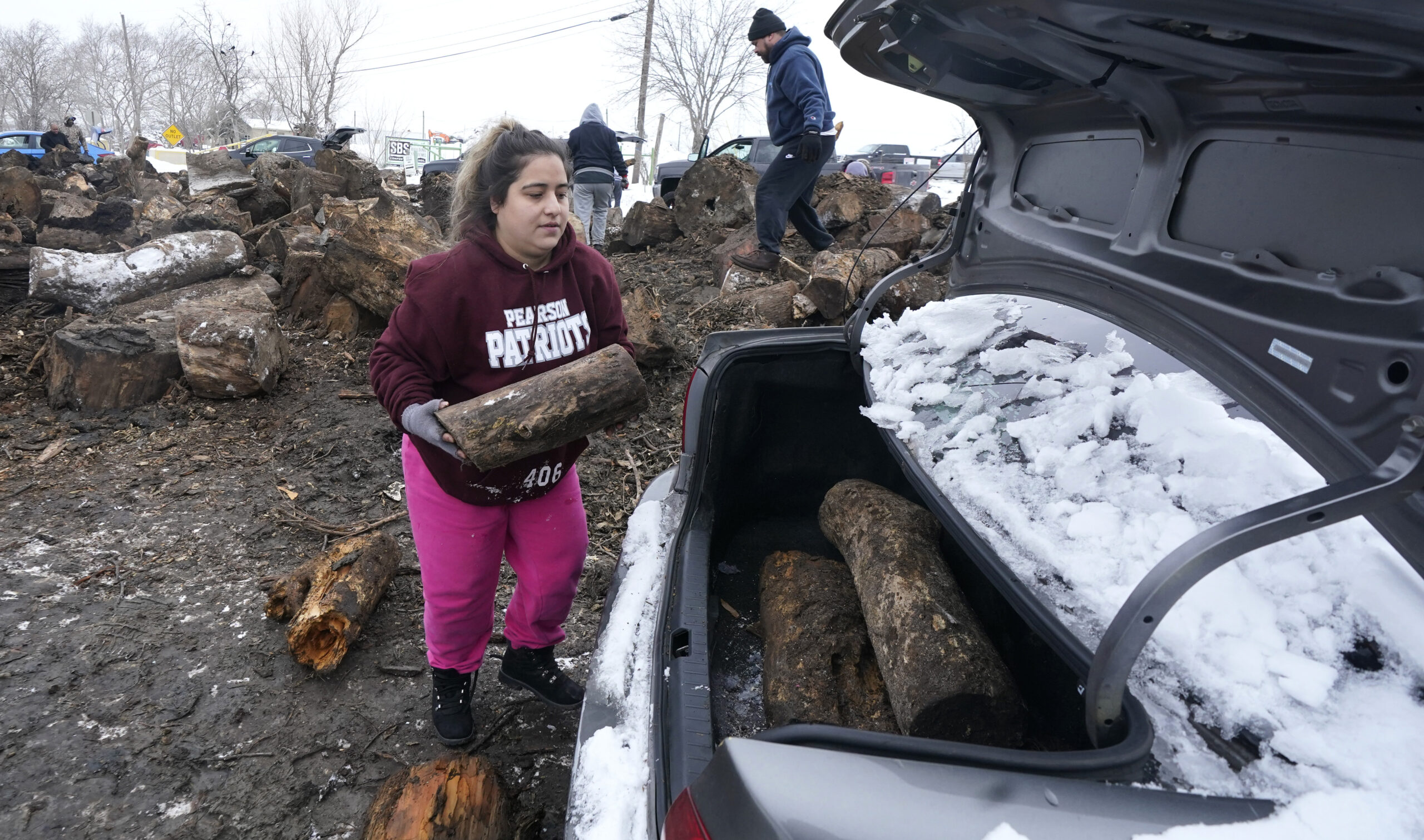
Sara Castillo loads firewood into her car Wednesday, Feb. 17, 2021, in Dallas. Castillo said the fire would be used to burn for warmth as her family has been without power since Sunday due to blackouts caused by extreme cold. (AP Photo/LM Otero)
The storms also left more than 330,000 from Virginia to Louisiana without power and about 71,000 in Oregon were still enduring a weeklong outage following a massive ice and snowstorm.
The snow and ice moved into the Appalachians, northern Maryland and southern Pennsylvania, and later the Northeast as the extreme weather was blamed for the deaths of at least 58 people, including a Tennessee farmer trying to save two calves that apparently wandered into a frozen pond and 17-year-old Oklahoma girl who fell into a frozen pond.
A growing number of people have perished trying to keep warm. In and around the western Texas city of Abilene, authorities said six people died of the cold—including a 60-year-old man found dead in his bed in his frigid home. In the Houston area, a family died from carbon monoxide as their car idled in their garage.
Utilities from Minnesota to Texas used rolling blackouts to ease strained power grids. But the remaining Texas outages were mostly weather-related, according to the state’s grid manager, the Electric Reliability Council of Texas.
Federal Emergency Manage-ment Agency acting administrator Bob Fenton said teams were in Texas with fuel, water, blankets and other supplies.
The storms also left more than 330,000 from Virginia to Louisiana without power and about 71,000 in Oregon were still enduring a weeklong outage following a massive ice and snowstorm.
The snow and ice moved into the Appalachians, northern Maryland and southern Pennsylvania, and later the Northeast as the extreme weather was blamed for the deaths of at least 58 people, including a Tennessee farmer trying to save two calves that apparently wandered into a frozen pond and 17-year-old Oklahoma girl who fell into a frozen pond.
A growing number of people have perished trying to keep warm. In and around the western Texas city of Abilene, authorities said six people died of the cold—including a 60-year-old man found dead in his bed in his frigid home. In the Houston area, a family died from carbon monoxide as their car idled in their garage.
Utilities from Minnesota to Texas used rolling blackouts to ease strained power grids. But the remaining Texas outages were mostly weather-related, according to the state’s grid manager, the Electric Reliability Council of Texas.
Federal Emergency Manage-ment Agency acting administrator Bob Fenton said teams were in Texas with fuel, water, blankets and other supplies.
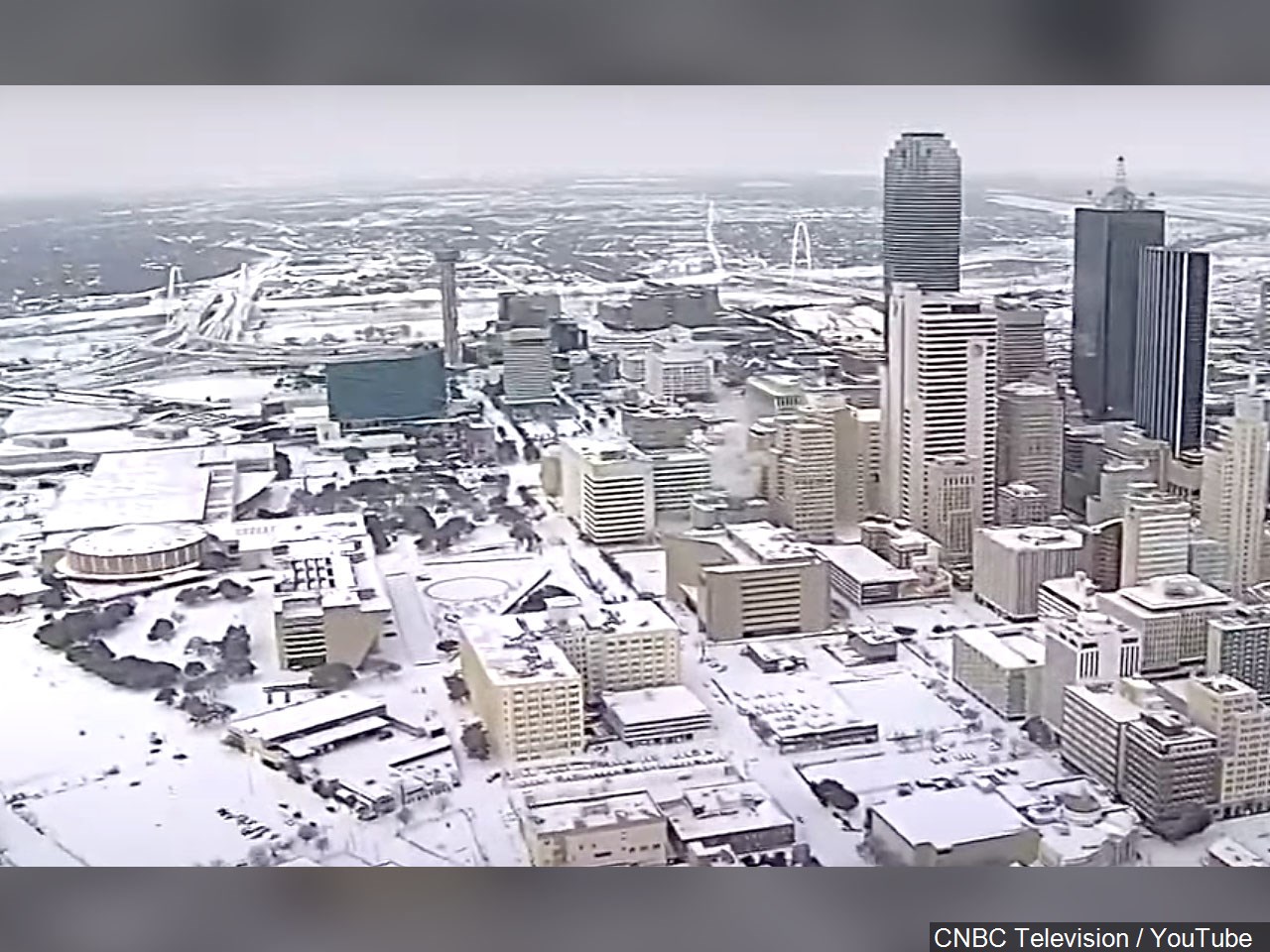
Deadly pileup caused by ice storms. Image: Youtube
“What has me most worried is making sure that people stay warm,” Mr. Fenton said on “CBS This Morning,” while urging people without heat to go to a shelter or warming center.
Rotating outages for Texas could return if electricity demand rises as people get power and heating back, said Dan Woodfin, the council’s senior director of system operations.
Adding to the misery: The weather jeopardized drinking water systems. Authorities ordered 7 million people—a quarter of the population of the nation’s second-largest state—to boil tap water before drinking it, following the record low temperatures that damaged infrastructure and pipes. In Abilene, a man died at a health care facility when a lack of water pressure made medical treatment impossible.
Water pressure dropped after lines froze and because many people left faucets dripping to prevent pipes from icing, said Toby Baker, executive director of the Texas Commission on Environmental Quality. Gov. Abbott urged residents to shut off water to prevent more busted pipes and preserve municipal system pressure.
President Joe Biden said he called Gov. Abbott and offered additional support from the federal government to state and local agencies.
Houston Mayor Sylvester Turner said residents will probably have to continue to boil tap water in the fourth-largest U.S. city for a few days.
“What has me most worried is making sure that people stay warm,” Mr. Fenton said on “CBS This Morning,” while urging people without heat to go to a shelter or warming center.
Rotating outages for Texas could return if electricity demand rises as people get power and heating back, said Dan Woodfin, the council’s senior director of system operations.
Adding to the misery: The weather jeopardized drinking water systems. Authorities ordered 7 million people—a quarter of the population of the nation’s second-largest state—to boil tap water before drinking it, following the record low temperatures that damaged infrastructure and pipes. In Abilene, a man died at a health care facility when a lack of water pressure made medical treatment impossible.
Water pressure dropped after lines froze and because many people left faucets dripping to prevent pipes from icing, said Toby Baker, executive director of the Texas Commission on Environmental Quality. Gov. Abbott urged residents to shut off water to prevent more busted pipes and preserve municipal system pressure.
President Joe Biden said he called Gov. Abbott and offered additional support from the federal government to state and local agencies.
Houston Mayor Sylvester Turner said residents will probably have to continue to boil tap water in the fourth-largest U.S. city for a few days.
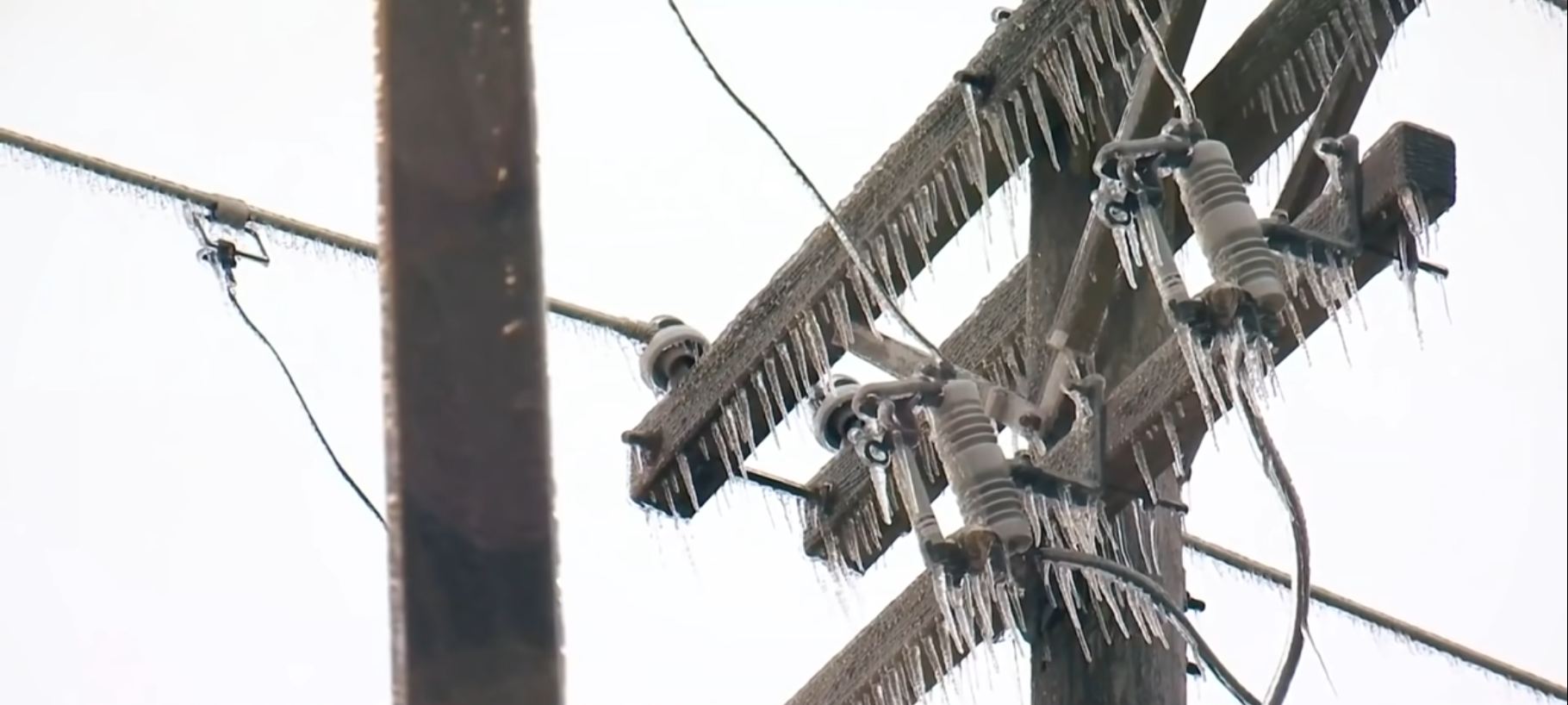
Power lines failed due to heavy ice storms. Image: Youtube
Federal emergency officials sent generators to support water treatment plants, hospitals and nursing homes in Texas, along with thousands of blankets and ready-to-eat meals, officials said. The Texas Restaurant Association was coordinating food donations to hospitals.
Two of Houston Methodist’s community hospitals had no running water and still treated patients but canceled most non-emergency surgeries and procedures for roughly two days, said spokeswoman Gale Smith.
As of afternoon Feb. 18, more than 1,000 Texas public water systems and 177 of the state’s 254 counties had reported weather-related operational disruptions, affecting more than 14 million people, according to the Texas Commission on Environmental Quality.
About 260,000 homes and businesses in Tennessee’s largest county, which includes Memphis, were told to boil water after cold temperatures led to water main ruptures and problems at pumping stations. Memphis International Airport canceled all incoming and outgoing passenger flights Feb. 19 due to water pressure issues.
Public health, public policy debacle
In Texas, more than 300 flights in and out of Dallas and Houston were canceled, according to flightaware.com. Particularly affected was American Airlines, headquartered in Fort Worth.
Federal emergency officials sent generators to support water treatment plants, hospitals and nursing homes in Texas, along with thousands of blankets and ready-to-eat meals, officials said. The Texas Restaurant Association was coordinating food donations to hospitals.
Two of Houston Methodist’s community hospitals had no running water and still treated patients but canceled most non-emergency surgeries and procedures for roughly two days, said spokeswoman Gale Smith.
As of afternoon Feb. 18, more than 1,000 Texas public water systems and 177 of the state’s 254 counties had reported weather-related operational disruptions, affecting more than 14 million people, according to the Texas Commission on Environmental Quality.
About 260,000 homes and businesses in Tennessee’s largest county, which includes Memphis, were told to boil water after cold temperatures led to water main ruptures and problems at pumping stations. Memphis International Airport canceled all incoming and outgoing passenger flights Feb. 19 due to water pressure issues.
Public health, public policy debacle
In Texas, more than 300 flights in and out of Dallas and Houston were canceled, according to flightaware.com. Particularly affected was American Airlines, headquartered in Fort Worth.
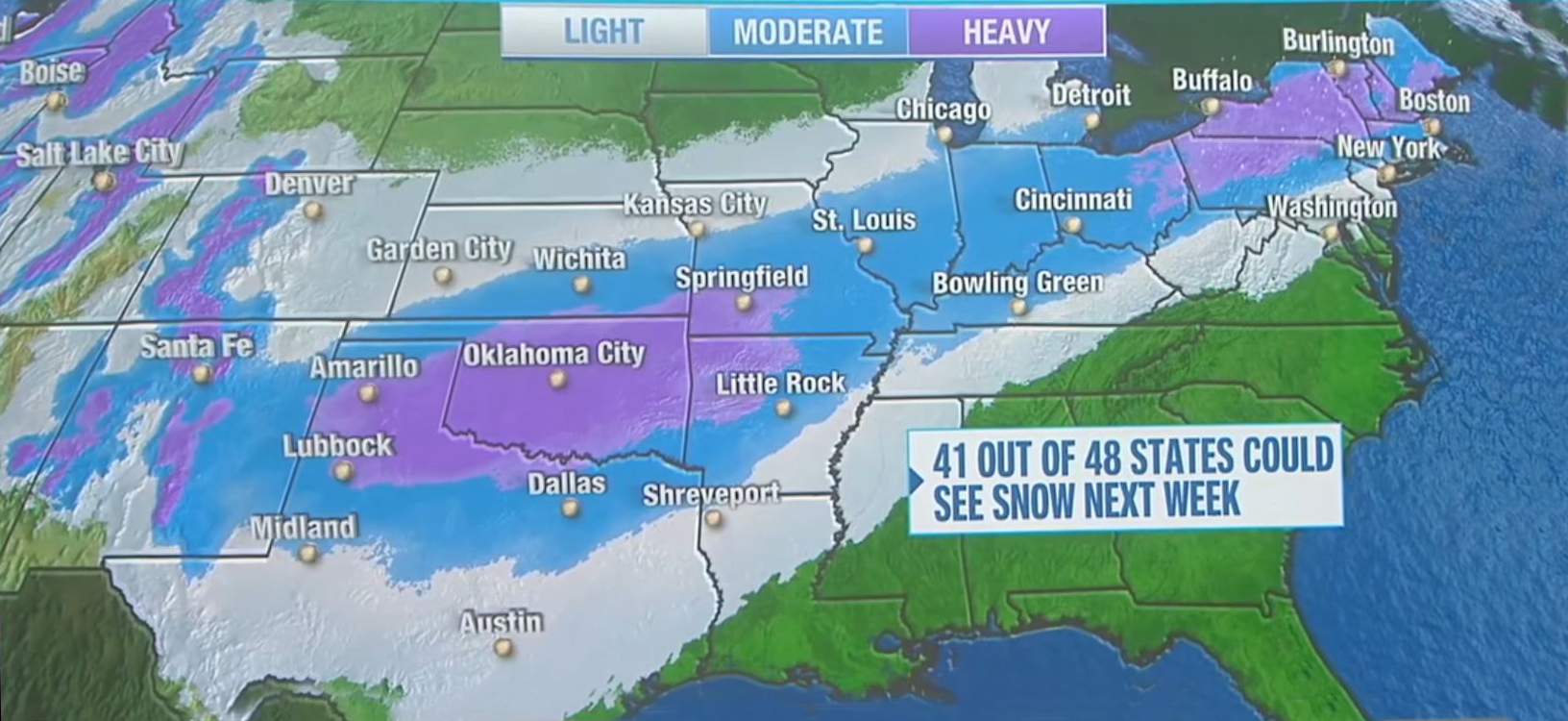
Feb 16 weather map. Image: Youtube
In Jackson, Mississippi, Mayor Chokwe Antar Lumumba said most of the city of about 161,000 was without water the night of Feb. 18. Crews pumped water to refill city tanks but faced a shortage of chemicals to treat the water, he said.
“We are dealing with an extreme challenge with getting more water through our distribution system,” Mayor Lumumba said.
About 85 seniors in a Jackson apartment building lost water service and were relying on deliveries from a building manager, said resident Linda Weathersby.
Ms. Weathersby went outside collecting buckets of ice to melt it so she could flush her toilet and said “my back’s hurting now.”
Before the wintry weather moved from Texas, the city of Del Rio along the U.S.-Mexico border, got nearly 10 inches of snow, surpassing the city’s one-day record for snowfall.
Among millions hit by the power outages were areas around Galveston and Houston, according to a website tracking the outages.
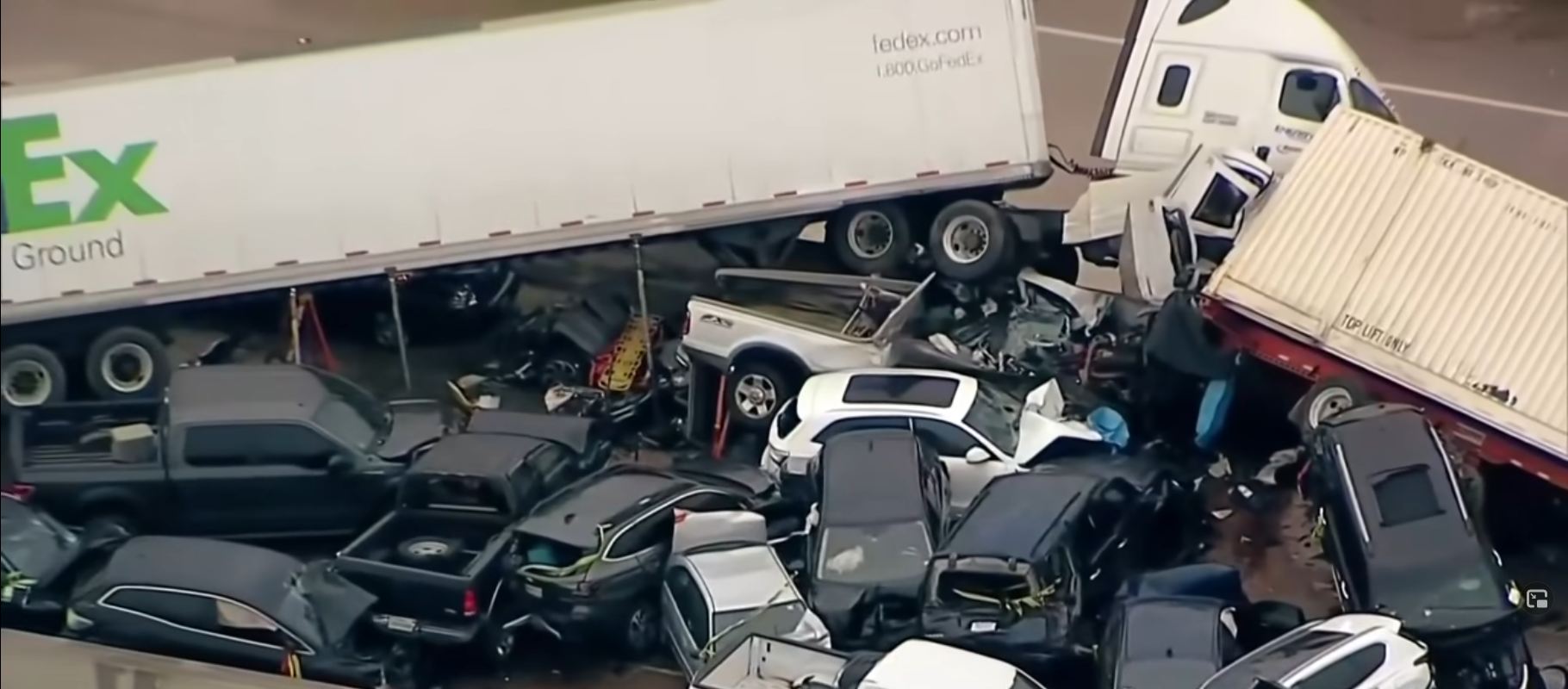
Deadly pileup caused by ice storms. Image: Youtube
The National Weather Service also warned: “Snow and freezing rain were expected to persist, raising travel concerns for parts of the eastern Great Lakes to New England … . Frigid Arctic air and dangerous wind chills were forecast in the Great Plains and Mississippi Valley.”
Low temperatures spread across the country, striking from Arkansas to Indiana and Illinois with record-low temperatures from Oklahoma City to Minnesota’s Iron Range, where thermometers dipped to minus 38, the National Weather Service added.
“This is a public health disaster and a public health emergency,” Dr. Samuel Prater, an emergency room physician at Memorial Hermann Texas Medical Center, said in a news briefing. He was referring to dozens of cases of carbon monoxide poisoning in the wake of power outages, said the Weather Channel.
In terms of magnitude, the storm created the greatest forced blackout in U.S. history as a result of a systemic and multifaceted failure, according to Bloomberg.com.
Politically, Sen. Ted Cruz was lambasted for taking his family on a Mexico vacation while his constituents suffered and died.
Storms bring economic pain
“The winter storm that barreled across much of the United States over the holiday weekend severely disrupted businesses including large car factories, retail chains and the delivery services that people are deeply reliant on for basic necessities,” observed the New York Times.
“General Motors, Ford Motor, Toyota, Nissan, and other automakers suspended or shut down production at plants from Texas to Indiana as rolling blackouts, natural gas shortages and icy conditions made it difficult to keep assembly lines running.”
“Walmart was forced to close as many as 500 stores across the South and Midwest, according to a map that was being updated in real-time on its website. Pharmacy chains also shut stores, potentially making it harder for customers to collect prescriptions and also delaying vaccinations against the coronavirus, which had begun at many pharmacies at the end of last week,” the Times added.
“The storm dealt a blow to huge economic hubs that are accustomed to hurricanes and tornadoes but not extreme winter weather that strains power grids and sends temperatures well below averages for this time of year.”
Winter Storm Uri caused an epic drop in U.S. oil production, according to Fox News. “Frigid temperatures knocked out electricity across Texas and resulted in one of the largest U.S. oil production disruptions ever. Shut-ins related to the winter storm have removed about 3 million barrels of daily oil production, or 27 percent of U.S. output, much of which comes from the oil-rich Permian Basin located in West Texas and Eastern New Mexico. Refining capabilities in Houston have also been knocked offline,” the report states.
“It really is a perfect storm,” said Stephen Schork, founder, and editor of the daily oil subscription newsletter The Schork Report. “We’ve had hurricanes, but this is an all-encompassing storm, the likes of which the North American or the U.S. refinery and oil market have never seen before.”
Up to one-half inch of ice made roads slick in parts of Louisiana, Mississippi, Alabama, Tennessee, and Kentucky, including Baton Rouge and Jackson, Mississippi.
According to the Weather Channel, snow from Uri also blanketed parts of the Ohio Valley, Great Lakes, and interior Northeast.
“By the morning of February 16, 73 percent of the area of the Lower 48 states was covered by snow, the most widespread snow cover in the contiguous U.S. in at least 17 years,” the Weather Channel reported.
“The Texas agricultural commissioner has said that farmers and ranchers have to throw away millions of dollars worth of goods because of a lack of power. ‘We’re looking at a food supply chain problem like we’ve never seen before, even with COVID-19,’ ” the commissioner told one local news affiliate.
“An energy analyst likened the power crisis to the fallout of Hurricane Katrina as it’s becoming increasingly clear that the situation in Texas is a statewide disaster,” reported Truthout.org.
“We know that according to the teachings of the Honorable Elijah Muhammad, there are four great judgments for America,” said Dr. Abdul Haleem Muhammad, the Nation of Islam Southeast Regional Student Minister based in Houston. He also leads the NOI mosque in the city.
“We see America’s arrogance and God’s ability to humble her using the forces of nature exacerbated by human-made errors and mistakes, for example, the failure of the power grid in Texas,” he said.
“It’s a national and international embarrassment that the quote ‘energy capital of the world’ has an energy failure of epic proportions,” he said.
Dr. Muhammad, who holds a Ph.D. in urban planning, also pointed out to The Final Call the disaster’s economic impact.
“The economic impact will be in the hundreds of millions to billions of dollars because there’s a disruption of the economy from top to bottom,” he said. “Without electricity, without power, you can’t do anything. Food is spoiling, busted pipes creating massive insurance repercussions. So the infrastructure, the cost of daily commerce, cost of the logistical supply chain in terms of freight, shipping, gas production. So there is a long-term economic cost that will be tabulated. Still, I suspect it will be in the hundreds of millions, if not billions of dollars.”
Dr. Muhammad added, “There are long lines and empty shelves at area grocery stores. People are not prepared for the fall of America. They really don’t see it. They don’t see the perfect storm of God’s judgment, the pandemic, the pestilence from heaven, racial reckoning, political gridlock, and now these calamities. They’re not prepared.”
The total damage and economic loss caused by the historic storm could be between $45 billion and $50 billion, said AccuWeather founder and CEO Dr. Joel N. Myers, whose damage estimates reflected the projections made by Dr. Muhammad.
To put the economic toll of the storm into context, AccuWeather’s estimate for the entire 2020 hurricane season, the most active hurricane season on record, was $60-65 billion.
“We have been experiencing one of the stormiest patterns seen in decades,” said Mr. Myers, who has been studying the economic impact of severe weather for over 50 years. The damage has been exacerbated by record cold temperatures that have pushed all the way to the Gulf Coast. Mr. Myers’ expert analysis helps emphasize the magnitude of the life-threatening crisis’s impact and the U.S. financial ramifications, reported AccuWeather.
Weather reflects political social climate in the U.S.?
Student Minister Rodney Muhammad from Muhammad Mosque No. 12 in Philadelphia told The Final Call the weather almost mirrors America’s mental atmosphere and social environment. “The weather’s devastating impact and aftermath, the consequences, it comes with a sense of destruction in it. And then it leaves a whole challenge. In some areas, millions are cut off from power,” he said.
“And so I thought about the snow and the Honorable Elijah Muhammad talking about snow and freezing temperatures and how it’s widespread, but he used the term ‘unusual weather.’ This weather and its timing as the government itself is tearing itself apart, I just think that the social atmosphere, the high level of dissatisfaction, a lot of public and social unrest, I think it’s demonstrated in the weather.”
“The people in the South traditionally they’re not even set up for this kind of weather. It’s always unusual when it’s occurring in areas that traditionally are just not accustomed to having that kind of weather. They found themselves totally unprepared. During the Capitol uprising, you had congressmen and senators running down hallways looking for places to hide totally unprepared,” he added from a northeastern city hit by snow, ice and cold.
“And so what we’ve had at the Capitol building is a false sense of security. And what we may have in different parts of the country being accustomed to a certain kind of weather was a false sense of security. I’m sure now if you live in Houston, Dallas, Fort Worth, you’re going to start remembering the unusual weather that came in,” Student Minister Rodney Muhammad said.
(The Associated Press contributed to this report.)
The National Weather Service also warned: “Snow and freezing rain were expected to persist, raising travel concerns for parts of the eastern Great Lakes to New England … . Frigid Arctic air and dangerous wind chills were forecast in the Great Plains and Mississippi Valley.”
Low temperatures spread across the country, striking from Arkansas to Indiana and Illinois with record-low temperatures from Oklahoma City to Minnesota’s Iron Range, where thermometers dipped to minus 38, the National Weather Service added.
“This is a public health disaster and a public health emergency,” Dr. Samuel Prater, an emergency room physician at Memorial Hermann Texas Medical Center, said in a news briefing. He was referring to dozens of cases of carbon monoxide poisoning in the wake of power outages, said the Weather Channel.
In terms of magnitude, the storm created the greatest forced blackout in U.S. history as a result of a systemic and multifaceted failure, according to Bloomberg.com.
Politically, Sen. Ted Cruz was lambasted for taking his family on a Mexico vacation while his constituents suffered and died.
Storms bring economic pain
“The winter storm that barreled across much of the United States over the holiday weekend severely disrupted businesses including large car factories, retail chains and the delivery services that people are deeply reliant on for basic necessities,” observed the New York Times.
“General Motors, Ford Motor, Toyota, Nissan, and other automakers suspended or shut down production at plants from Texas to Indiana as rolling blackouts, natural gas shortages and icy conditions made it difficult to keep assembly lines running.”
“Walmart was forced to close as many as 500 stores across the South and Midwest, according to a map that was being updated in real-time on its website. Pharmacy chains also shut stores, potentially making it harder for customers to collect prescriptions and also delaying vaccinations against the coronavirus, which had begun at many pharmacies at the end of last week,” the Times added.
“The storm dealt a blow to huge economic hubs that are accustomed to hurricanes and tornadoes but not extreme winter weather that strains power grids and sends temperatures well below averages for this time of year.”
Winter Storm Uri caused an epic drop in U.S. oil production, according to Fox News. “Frigid temperatures knocked out electricity across Texas and resulted in one of the largest U.S. oil production disruptions ever. Shut-ins related to the winter storm have removed about 3 million barrels of daily oil production, or 27 percent of U.S. output, much of which comes from the oil-rich Permian Basin located in West Texas and Eastern New Mexico. Refining capabilities in Houston have also been knocked offline,” the report states.
“It really is a perfect storm,” said Stephen Schork, founder, and editor of the daily oil subscription newsletter The Schork Report. “We’ve had hurricanes, but this is an all-encompassing storm, the likes of which the North American or the U.S. refinery and oil market have never seen before.”
Up to one-half inch of ice made roads slick in parts of Louisiana, Mississippi, Alabama, Tennessee, and Kentucky, including Baton Rouge and Jackson, Mississippi.
According to the Weather Channel, snow from Uri also blanketed parts of the Ohio Valley, Great Lakes, and interior Northeast.
“By the morning of February 16, 73 percent of the area of the Lower 48 states was covered by snow, the most widespread snow cover in the contiguous U.S. in at least 17 years,” the Weather Channel reported.
“The Texas agricultural commissioner has said that farmers and ranchers have to throw away millions of dollars worth of goods because of a lack of power. ‘We’re looking at a food supply chain problem like we’ve never seen before, even with COVID-19,’ ” the commissioner told one local news affiliate.
“An energy analyst likened the power crisis to the fallout of Hurricane Katrina as it’s becoming increasingly clear that the situation in Texas is a statewide disaster,” reported Truthout.org.
“We know that according to the teachings of the Honorable Elijah Muhammad, there are four great judgments for America,” said Dr. Abdul Haleem Muhammad, the Nation of Islam Southeast Regional Student Minister based in Houston. He also leads the NOI mosque in the city.
“We see America’s arrogance and God’s ability to humble her using the forces of nature exacerbated by human-made errors and mistakes, for example, the failure of the power grid in Texas,” he said.
“It’s a national and international embarrassment that the quote ‘energy capital of the world’ has an energy failure of epic proportions,” he said.
Dr. Muhammad, who holds a Ph.D. in urban planning, also pointed out to The Final Call the disaster’s economic impact.
“The economic impact will be in the hundreds of millions to billions of dollars because there’s a disruption of the economy from top to bottom,” he said. “Without electricity, without power, you can’t do anything. Food is spoiling, busted pipes creating massive insurance repercussions. So the infrastructure, the cost of daily commerce, cost of the logistical supply chain in terms of freight, shipping, gas production. So there is a long-term economic cost that will be tabulated. Still, I suspect it will be in the hundreds of millions, if not billions of dollars.”
Dr. Muhammad added, “There are long lines and empty shelves at area grocery stores. People are not prepared for the fall of America. They really don’t see it. They don’t see the perfect storm of God’s judgment, the pandemic, the pestilence from heaven, racial reckoning, political gridlock, and now these calamities. They’re not prepared.”
The total damage and economic loss caused by the historic storm could be between $45 billion and $50 billion, said AccuWeather founder and CEO Dr. Joel N. Myers, whose damage estimates reflected the projections made by Dr. Muhammad.
To put the economic toll of the storm into context, AccuWeather’s estimate for the entire 2020 hurricane season, the most active hurricane season on record, was $60-65 billion.
“We have been experiencing one of the stormiest patterns seen in decades,” said Mr. Myers, who has been studying the economic impact of severe weather for over 50 years. The damage has been exacerbated by record cold temperatures that have pushed all the way to the Gulf Coast. Mr. Myers’ expert analysis helps emphasize the magnitude of the life-threatening crisis’s impact and the U.S. financial ramifications, reported AccuWeather.
Weather reflects political social climate in the U.S.?
Student Minister Rodney Muhammad from Muhammad Mosque No. 12 in Philadelphia told The Final Call the weather almost mirrors America’s mental atmosphere and social environment. “The weather’s devastating impact and aftermath, the consequences, it comes with a sense of destruction in it. And then it leaves a whole challenge. In some areas, millions are cut off from power,” he said.
“And so I thought about the snow and the Honorable Elijah Muhammad talking about snow and freezing temperatures and how it’s widespread, but he used the term ‘unusual weather.’ This weather and its timing as the government itself is tearing itself apart, I just think that the social atmosphere, the high level of dissatisfaction, a lot of public and social unrest, I think it’s demonstrated in the weather.”
“The people in the South traditionally they’re not even set up for this kind of weather. It’s always unusual when it’s occurring in areas that traditionally are just not accustomed to having that kind of weather. They found themselves totally unprepared. During the Capitol uprising, you had congressmen and senators running down hallways looking for places to hide totally unprepared,” he added from a northeastern city hit by snow, ice and cold.
“And so what we’ve had at the Capitol building is a false sense of security. And what we may have in different parts of the country being accustomed to a certain kind of weather was a false sense of security. I’m sure now if you live in Houston, Dallas, Fort Worth, you’re going to start remembering the unusual weather that came in,” Student Minister Rodney Muhammad said.
(The Associated Press contributed to this report.)














